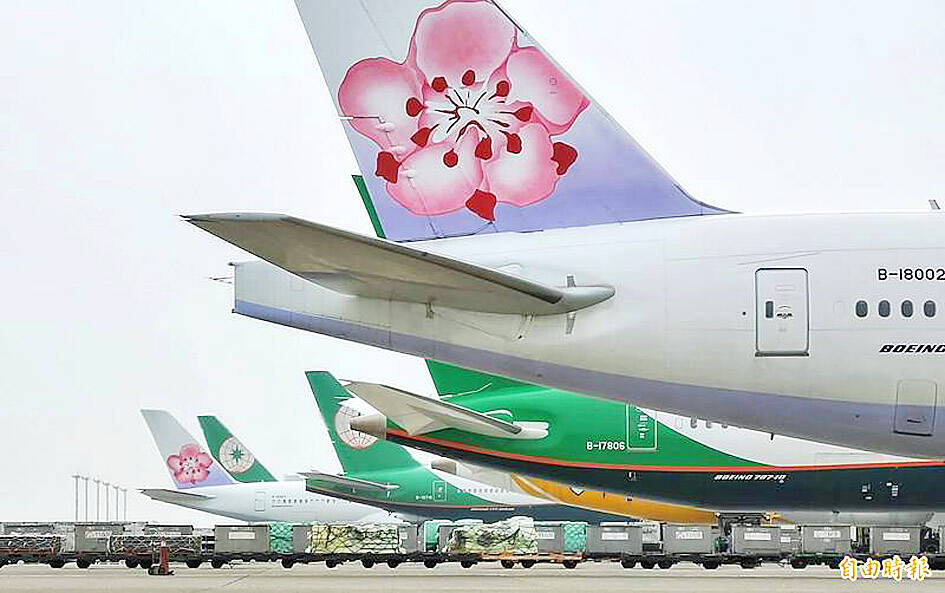China Airlines Ltd (中華航空) yesterday said it would pay its employees year-end bonuses of five months salary, plus a one-time cash reward of NT$20,000 (US$642) and an average salary increase of 4 percent.
The plan was approved at a board meeting yesterday, the company said in a statement.
China Airlines' consolidated sales were NT$184.82 billion last year, up 22.62 percent year-on-year, the company said.

Photo: Tony Yao, Taipei Times
The outlook for this year appears optimistic, it said, adding that booking rates for popular slots during the Lunar New Year holiday and winter break have already surpassed 80 percent.
Thanks to significant increases in revenue fueled by the demand for post-COVID-19 pandemic air travel, several other carriers have also announced salary increases and other forms of remuneration for employees after reporting higher revenue for last year compared with the previous year.
EVA Airways Corp (長榮航空) last month said that it would pay its employees year-end bonuses of six months salary, the highest since the company was founded, as well as a mid-year bonus to be paid later this year.
As well as the additional payments, which would apply to airline employees and those working in its subsidiaries, crew and ground staff would also receive an average monthly pay increase of NT$5,000, and pilots would get an additional NT$11,000 to NT$20,000 depending on their rank, EVA Airways said.
The airline's consolidated revenue last year rose 45.11 percent from a year earlier to NT$200.36 billion, a record high, with passenger revenue alone increasing by 326.01 percent from a year earlier.
Tigerair Taiwan Ltd (台灣虎航) has unveiled plans to give its workers year-end bonuses of two months salary. Along with the additional one month already distributed and another to be paid at the end of the year, employees are set to receive additional compensation of four months salary, it said.
The company's consolidated revenue last year surged by 848.29 percent year-on-year to NT$12.47 billion. It attributed the strong growth to its sales performance in the fourth quarter of last year, which soared to an all-time high thanks to a strong travel interest in Northeast Asia.
Starlux Airlines Co (星宇航空) plans to provide a one-month bonus and a salary increase of NT$2,000, plus an additional transport allowance of NT$1,000, the start-up said.
It reported consolidated revenue last year jumped 568.39 percent year-on-year to NT$22.47 billion.
This year, the airline aims to aggressively expand its flight network, connecting new destinations such as Chiang Mai, Thailand and Hakodate, Japan, it said.
This story has been updated since it was first published to add airlines' revenue information for last year.

When an apartment comes up for rent in Germany’s big cities, hundreds of prospective tenants often queue down the street to view it, but the acute shortage of affordable housing is getting scant attention ahead of today’s snap general election. “Housing is one of the main problems for people, but nobody talks about it, nobody takes it seriously,” said Andreas Ibel, president of Build Europe, an association representing housing developers. Migration and the sluggish economy top the list of voters’ concerns, but analysts say housing policy fails to break through as returns on investment take time to register, making the

EARLY TALKS: Measures under consideration include convincing allies to match US curbs, further restricting exports of AI chips or GPUs, and blocking Chinese investments US President Donald Trump’s administration is sketching out tougher versions of US semiconductor curbs and pressuring key allies to escalate their restrictions on China’s chip industry, an early indication the new US president plans to expand efforts that began under former US president Joe Biden to limit Beijing’s technological prowess. Trump officials recently met with their Japanese and Dutch counterparts about restricting Tokyo Electron Ltd and ASML Holding NV engineers from maintaining semiconductor gear in China, people familiar with the matter said. The aim, which was also a priority for Biden, is to see key allies match China curbs the US

NOT TO WORRY: Some people are concerned funds might continue moving out of the country, but the central bank said financial account outflows are not unusual in Taiwan Taiwan’s outbound investments hit a new high last year due to investments made by contract chipmaker Taiwan Semiconductor Manufacturing Co (TSMC, 台積電) and other major manufacturers to boost global expansion, the central bank said on Thursday. The net increase in outbound investments last year reached a record US$21.05 billion, while the net increase in outbound investments by Taiwanese residents reached a record US$31.98 billion, central bank data showed. Chen Fei-wen (陳斐紋), deputy director of the central bank’s Department of Economic Research, said the increase was largely due to TSMC’s efforts to expand production in the US and Japan. Investments by Vanguard International

STRUGGLING TO SURVIVE: The group is proposing a consortium of investors, with Tesla as the largest backer, and possibly a minority investment by Hon Hai Precision Nissan Motor Co shares jumped after the Financial Times reported that a high-level Japanese group has drawn up plans to seek investment from Elon Musk’s Tesla Inc to aid the struggling automaker. The group believes the electric vehicle (EV) maker is interested in acquiring Nissan’s plants in the US, the newspaper reported, citing people it did not identify. The proposal envisions a consortium of investors, with Tesla as the largest backer, but also includes the possibility of a minority investment by Hon Hai Precision Industry Co (鴻海精密) to prevent a full takeover by the Apple supplier, the report said. The group is